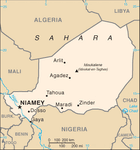Browse All Nigerien Recipes: Nigerien Appetizers | Nigerien Beverages | Nigerien Soups | Nigerien Salads | Nigerien Vegetarian | Nigerien Meat Dishes | Nigerien Snacks | Nigerien Desserts

|
This article is a stub! This article doesn't contain enough information. If you know anything about Nigerien Cuisine, please add to this article!
|
For the Cuisine of Nigeria, see Nigerian Cuisine
Overview of Nigerien Cuisine History[]
Over 90 percent of the population of Niger lives in the southwest corner of the country near the fertile Niger River basin. Located on the edge of the Niger River is the capital of Niger, Niamey, a major trading center of West Africa. The cuisine of Niger is closely similar to those of the neighboring countries such as Nigeria to the south, Chad to the east and Algeria and Libya to the north of the country. The official language of Niger is French but a number of local languages are commonly spoken throughout the region and emphasized in schools. Niger has been a territory dominated by colonization and foreign occupation, a fact that is clearly displayed in the national cuisine. Influences from Portuguese or British occupants can be noticed in Niger’s modern cuisine. While the influences are present, they are still diminished when compared to the traditional heritage of the cuisine of Niger. Most of the Nigerian cuisine is hot and spicy, but there is a great deal of flexibility involved and many meals allow you to make the dish as hot as you prefer. Niger is still dominated by a rural cuisine where recipes are passed down from mother to daughter. Very few recipes are documented in writing and this is one of the reasons why Niger’s cuisine is less famous on an international level.
Cuisines of Niger[]

Map of Niger- Click to enlarge
Niger is situated in a position that favored a meeting point for many different cuisine types. The traditional African cuisine is blended with influences from Europe that have remained in Niger since the colonization period. Being a neighbor of Algeria, the northern part of Niger receives quite a few dishes from the French influenced Algerian cuisine. You shouldn’t be surprised to find a very similar meal offer in many restaurants in Niger that will instantly have you thinking of the French cuisine. The northern African influences also came via traders, travelers, invaders, migrants and immigrants and the diversity of dishes you will find in the flexible cuisine of Niger is quite overwhelming. Spices like saffron, nutmeg, cinnamon, ginger and cloves were introduced by the Arabs and they are often part of the dishes served in modern Niger. The western part of Niger is influenced by the culinary habits of the Central African countries while the south receives a lot of similar dishes to the Nigerian cuisine. The south western capital city of Niamey receives the influences of several different African cuisines and is one of the spots where you can expect to find most of the national dishes together under one roof. nigeriens use different spices to cook foods such as rice, salad, and many others.
Preparation Methods for Nigerien Cooking[]
While many European or American visitors find Niger extremely exotic at a first glance, the truth is that globalization is also present here, and many of the traditional preparation methods were replaced by modern, faster and more effective cooking techniques. However meat is often cooked on a grill over hot coals – still retains that rural feel that makes it an even more attractive dish. Of course, traditional cooking methods for meat included hot coal cooking and you shouldn’t be surprised to find restaurants that still use such cooking techniques – often visible to the viewers/clients. On the other hand, in an average home in the city you will most likely come across non-stick pots and pans and all the modern utensils you have in your own kitchen.
Special Equipment for Nigerien Cooking[]
While rustic cooking methods are also very appreciated, they are mostly reserved for restaurants that wish to impress their clients with a traditional meal. In most places, Niger cooking uses the same standard instruments used in many European countries or in the United States of America. Ranging from cake pans, can openers, colanders, egg rings, poachers and holders, food dishers & portioners, food pans & food containers to other kitchen utensils, such as food scales, food scoops and fryer baskets & accessories, the cuisine of Niger needs a diverse cooking equipment set in order to produce the most sophisticated dishes. Here are a few other items that will come handy while cooking Niger-specific food: juicers, kitchen knives, kitchen slicers, kitchen thermometers, measuring cups & measuring spoons, miscellaneous utensils, mixing bowls and skimmers & strainers.
Nigerien Food Traditions and Festivals[]
Most countries see festivities as a way to taste the finer things of life, and Niger does not make an exception. Food is, of course, one of the main elements that accompany many celebrations. The most important celebrations in Niger are as follows: 1 January New Year's Day; 1 May Worker's Day; 3 August Independence Day; 5 September Settler's Day; 18 December Republic Day; 25 December Christmas Day. There are also variable holidays such as Good Friday and Easter Monday, and various Islamic Holidays, each having it’s own specific foods and culinary arrangements.
People in Nigerien Food[]
- Are you into Nigerien Cooking and would like to be interviewed?
Because of their exotic tastes and looks, Niger-specific dishes that can be enjoyed on an international scale. There are many chefs who creatively use the basic ingredients and cooking method for traditional dishes and create original and delicious food variations. Chefs from Niger are passionate about their traditional dishes and they enjoy presenting them to foreigners who have never tasted them before. Whether they are cooking traditional meals or more sophisticated dishes, such as simple yet tasty meat stews or refreshing salads for those hot Niger days, these chefs take pride in what they do, and this is readily noticeable in the unforgettable taste of their cooking.
